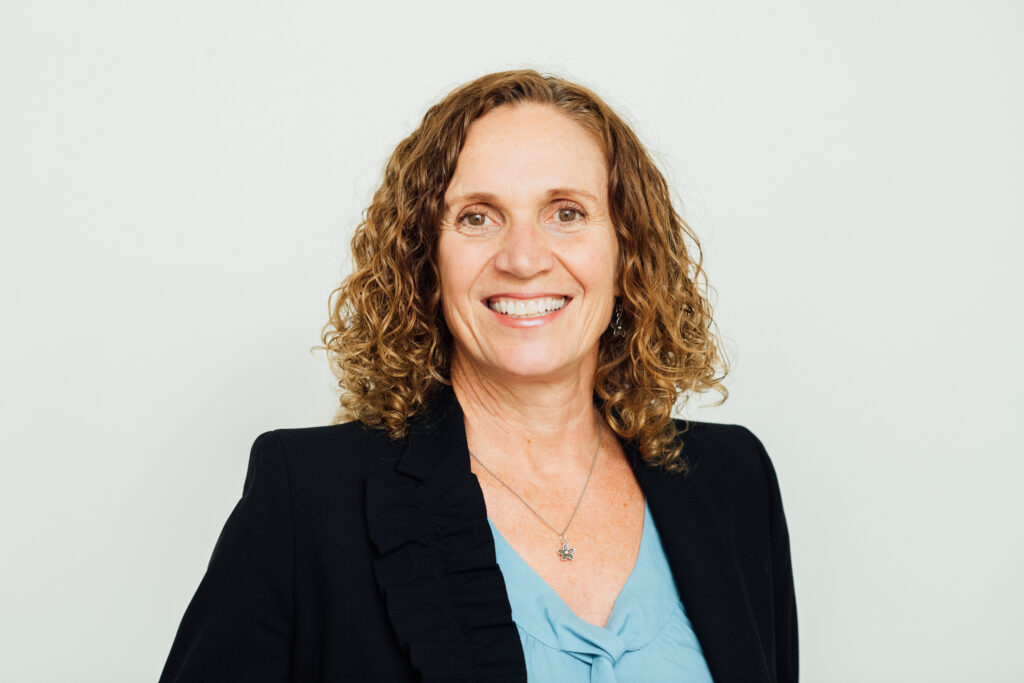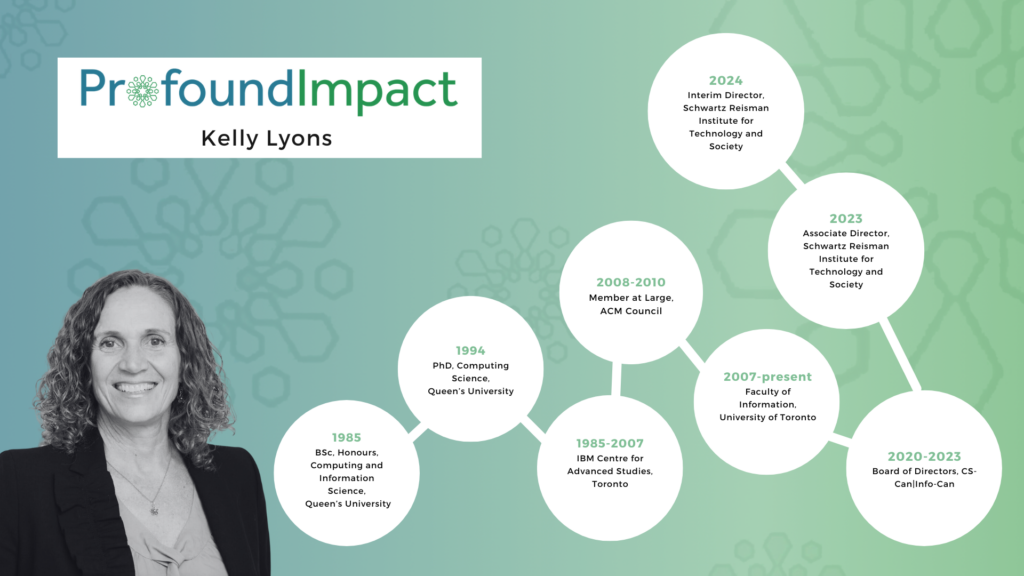

Professor, Faculty of Information, Cross-Appointed to the Department of Computer Science, University of Toronto
Interim Director, Schwartz Reisman Institute for Technology and Society
Kelly Lyons has always loved solving tricky puzzles and enjoyed math and science in high school. “Physics was my favourite,” she says. But when Mr. Lowe, her physics teacher asked her what she wanted to do when she graduated, she told him she hadn’t decided. He had a suggestion: “You should try Computer Science. My daughter is a computer scientist. She loves math and she loves physics and now she makes a ton of money and travels all over the world.”
Kelly was born and raised in Fort Frances, Ontario, an isolated town of 8,000 people located between Winnipeg and Thunder Bay. “I went across the border to International Falls, Minnesota, to movies, dances and even for my piano lessons.” While many of her friends got jobs after high school, Kelly wanted to go to University. “I loved everything about school. I loved studying. Weirdly, I even loved exams.” She took Mr. Lowe’s advice and traveled east to Queen’s University to study computer science.
After completing her undergraduate degree, she applied for, and was awarded, an NSERC postgraduate scholarship to attend graduate school. “At the time, many of my university classmates were applying for jobs, so I submitted my resume to Bell Northern Research, Nortel and IBM, all of whom were interviewing on campus.”
The manager from IBM was very enthusiastic during the interview. “I’ve already decided that I’m going to hire you,” announced the interviewer from IBM. “I just haven’t decided yet which team I’m going to put you on.”
Kelly deferred her NSERC scholarship for two years to take the job at IBM, where she worked on the testing team for Fortran compilers. “When I arrived at IBM, I told my manager that I would only be in the position for two years before returning to Queen’s for graduate school. He told me that he was going to pretend he didn’t hear that because if he did, I wouldn’t be offered the opportunities I deserved. And I might change my mind about grad school.”
At the end of those two years, newly married and ready to move back to Kingston for graduate school, Kelly let her manager know that she was leaving and asked for advice on how to resign. He suggested, and she agreed, to take a leave of absence instead so that she could, if she wished, return to IBM after completing her graduate work.
After earning her master’s degree, she applied to and was accepted into the PhD program at Queen’s. “When I told my manager that now I was definitely quitting, he said something I’ve never forgotten: ‘Never say never. The world could change. You could change. IBM could change.’ So, instead of quitting, I took an extended leave of absence.”
IBM launched CAS, the Centre for Advanced Studies, in Toronto as Kelly was approaching the completion of her PhD. When an IBM representative visited the Queen’s campus to talk about CAS, she met him for lunch and learned more about the centre. “This sounded like a great place,” says Kelly. “I then met with Jacob Slonim, the head of CAS Toronto, who was enthusiastic about having me join.”
Kelly’s first role at IBM was as a software developer. Nineteen years later, in 2004, she was appointed as the Head of CAS Toronto, where she was responsible for approximately 60 applied collaborative research projects with universities, approximately 100 visiting university researchers, and CASCON, Canada’s premier international general computer science conference which hosted over 1,500 attendees annually.
Kelly loved her work at CAS, where, in addition to heading the Centre, she co-supervised students and wrote research papers with them in her role as Adjunct Professor of Computer Science at Dalhousie University and York University. “One of my proudest moments as the Head of CAS Toronto was when the CAS Toronto partnerships won the NSERC Synergy Award for Innovation in the Leo Derikx category for ‘an established innovative model of long-standing university-industry partnership in pre-competitive R&D that has improved the general well-being of an industry.’ Another proud moment was in 2005 when CAS Toronto celebrated incredible people and their inspiring stories via the Computing Pioneers of Canada.”
Kelly’s tenure at IBM was meant to be short-term. “I always knew I wanted to be a professor”, she says. The next logical career move at IBM would have been much more administratively heavy than her role heading CAS, leaving very little time to conduct research or work with students. It was time to pursue her dream of being a professor.
“I have been very lucky to work with outstanding researchers and leaders from across Canada while at CAS,” notes Kelly. She consulted with some of those researchers and was encouraged to apply for an open position within the Faculty of Information at the University of Toronto. She joined the faculty as Associate Professor in 2007 and is currently a Professor there with a cross-appointment to the Department of Computer Science.
Kelly’s experience in industry and as an active researcher has led her to work in a range of leadership roles at the University of Toronto. From 2015 to 2020, she was Associate Dean, Academic in the Faculty of Information, and from 2020 to 2021, she served as the Dean’s Advisor on Pandemic Planning and Response. She served as Acting Vice Dean, Research and Program Innovation, in the School of Graduate Studies from January to June 2023.
In January, 2024, Kelly was appointed Interim Director of the Schwartz Reisman Institute for Technology and Society (SRI) at the University of Toronto after serving both as a faculty affiliate and one of the institute’s three associate directors. SRI’s focus on multi-disciplinary research on how technology, systems and society interact is a good fit for Kelly’s research on service science, knowledge mobilization, data science, social media, collaborative work and software engineering. “What defines a service system is value co-creation. It takes at least two entities to come together to co-create a service – it can’t be created without a client in mind. I conduct research on how social media can play the role of technological intermediary between and among service systems,” says Kelly.
Kelly has served the computer science community through her role on the Board of Directors of CS-Can|Info-Can from 2020 – 2023 and as a Member‐at‐Large of the ACM Council from 2008 to 2012. She has supported, advocated, and celebrated women in computing as a member of the Executive Council of ACM‐W and by her contribution to the book Rendering History: The Women of ACM-W. Kelly was one of nine influential women who expressed their views on representation within the technical and AI communities for a recent article in Forbes magazine. In the article by Hessie Jones, titled A Call For A Systemic Dismantling: These Women Refuse To Be Hidden Figures In The Development Of AI, she is quoted as saying, “I have been fortunate to be part of a strong network of very smart, technical women in industry and academia. We may be smaller in proportion within the technical community, but we are large in our voices, our contributions, and our support for one another. The need for initiatives increasing diversity in tech—and especially in the world of artificial intelligence—is vital. We must ensure that the people working on AI systems reflect the concerns, experiences, and identities of the populations affected by these systems. Advocating for women in the AI sector requires a strong, united voice.”
As she begins to plan for the next phase of her career, including plans for retirement, Kelly is focusing an increasing amount of her time on mentoring. “My plan is to retire from teaching and administration and to continue research as a Professor Emerita,” says Kelly. “I decided that I need a way to decide which of the opportunities presented to me to pursue. I am choosing those in which I can collaborate with and support women and others at the margins in Computer Science.”
Kelly’s career has included management and collaborative research roles at IBM, internationally-recognized research on developing technology with a human-centric approach, administrative leadership at the University of Toronto and service to the computer science community. And her success in her dream job as professor is best expressed by one of her students: “Kelly is a really good professor. She is compassionate and kind. She lights up the classroom with her passion about the subject matter.”
